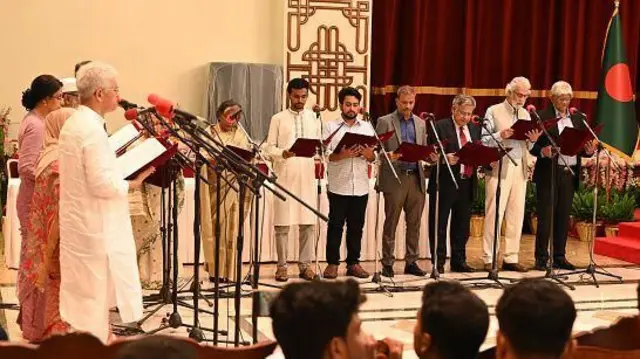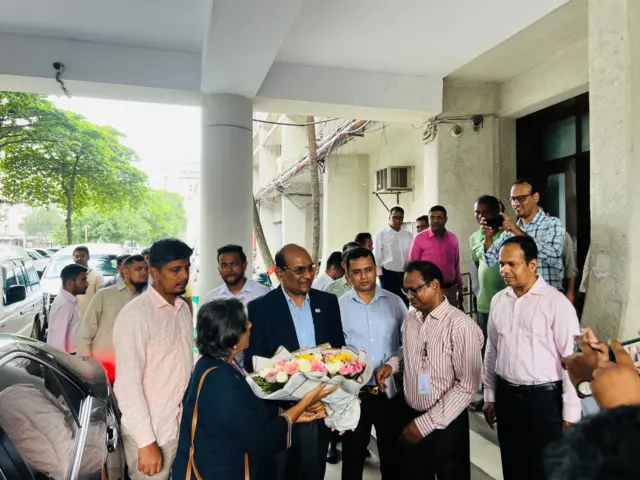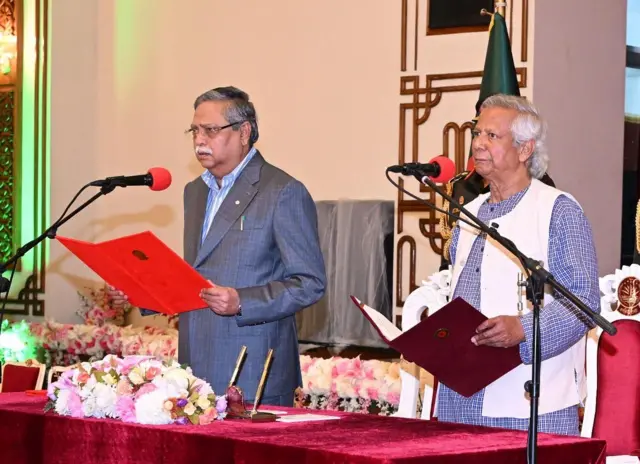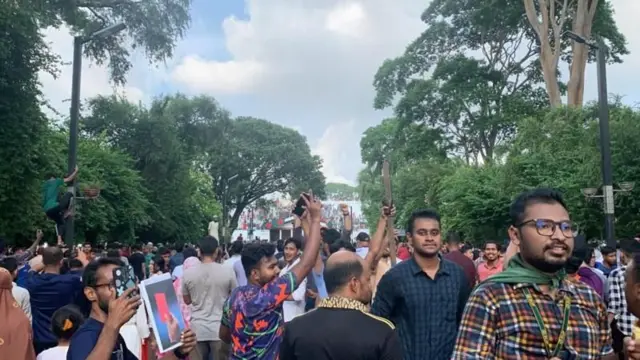The interim government led by Professor Muhammad Yunus has already started the work of transfer, appointment or new appointment in various institutions.
On Wednesday, the contracts of ten officials of the rank of secretary were cancelled.
It is known that officials who have been cornered in various organizations for a long time have started running for important positions.
Analysts say that in the past decade and a half, party considerations have been given priority over merit in recruitment or posting in various government institutions including the police, public administration. That is why such a situation is seen only after the change of government.
Public administration expert Prof. Abul Kashem Majumdar told BBC Bangla, “Due to complete partyization, an unstable situation has been created in the administration and government. If the qualified and talented people were in these positions then maybe they would not have to move.”
Various appointments of Principal Secretary to the Prime Minister, IGP of Police who were on contract basis before the new government took charge have been cancelled.
For the last 16 years, due to the transfer or dismissal of such appointees in various parts of the government, there is a kind of instability at various levels of the administration.
In such a situation, there are many questions about whether there will be a crisis if changes or reforms are made in a hurry.
Ali Imam Majumder, Special Assistant to the Chief Advisor of the new Interim Government and former Cabinet Secretary, told BBC Bangla that when the government changes, there is a need for a change on a more urgent basis. Those who are now unable to function properly from the responsibilities are being rapidly changed in all the national places.”

Resignation, transfer and discharge
Since the fall of the Awami League government and the assumption of the interim government, many people including the Chief Justice of Bangladesh, Judges of Appellate Division, Attorney General, Police Officers, various government offices, University Vice-Chancellors have left their posts.
Some of them resigned under pressure. Someone left the post voluntarily.
Chief Justice of Bangladesh, judges of Appellate Division resigned in face of demands of anti-discrimination student movement. The Attorney General, some Deputy Attorney General and many of the Attorney General’s office have resigned from their duties.
In the meantime four top officials including the Governor, Deputy Governor of Bangladesh Bank have resigned.
From the day after the fall of the Sheikh Hasina government, the officers and employees of the bank protested to demand their resignation.
Also, the incumbents are stepping down from the posts of the heads of various institutions including the vice chancellors of various public universities including Dhaka-Jahangirnagar, the chairman of the University Grants Commission, the director general of Bangla Academy, Shilpakala Academy.
Former Secretary Abu Alam Shahid Khan told BBC Bangla, “Those who were in power for so long, they made appointments for political considerations to retain power. Those holding those positions are voluntarily stepping down due to pot changes.”
In the past week, the heads of various government and state intelligence agencies have also been removed from their posts.
Public administration experts say that due to the appointment of parties to important positions of the state, after the change in the government, all those institutions have to be reformed on an urgent basis.
However, some analysts are warning against ‘another partyization’ in the administration reform.

All questions related to contractual recruitment
Current cabinet secretary Mahbub Hossain and former prime minister’s chief secretary. Former Sheikh Hasina’s government appointed Tofazzal Hossain Mia on contractual basis even after the expiry of his term.
The Chief Secretary’s contract was canceled two days after Sheikh Hasina resigned and left the country. However, the Cabinet Secretary Mr. Hussain.
Chowdhury Abdullah Al Mamun was the Inspector General of Police or IGP until last August 6. The tenure of this police officer expired two years ago. But the outgoing government extended his term in two rounds.
After the fall of Sheikh Hasina’s government Mr. Mamun’s contractual appointment was cancelled. New IGP appointed.
There are many important positions of public administration, secretaries of various ministries, and many are in contractual appointments.
Former Secretary Abu Alam Shahid Khan told BBC Bangla, “Contract-based appointments are made on a case-by-case basis, those who have served the government’s purpose the most were appointed during the previous government.”
As usual, after a post in the administration becomes vacant, another officer sits in that post. But due to contractual recruitment, many feel that they have been left behind.
Professor Yunus’s special assistant Ali Imam Majumder told BBC Bangla, “Many people were appointed contractually in many places with special considerations. We are selecting those who are not considered necessary and hiring new people”.
Not only cancellation, analysts are suggesting that those who exercised power and corruption by getting contractual appointments should be prosecuted.

How long will it take to break the deadlock?
After the fall of the Sheikh Hasina government, the most stagnation was created in the police, RAB and other law and order forces. There were changes in various important posts including the post of Police-RAB chief.
Even after returning to work, the police administration is still not completely back to normal. Because some of those who were serving in important positions in the police administration did not return to duty after the fall of Sheikh Hasina.
Many of the top officials of the government institutions which have been appointed such as the High Court, Bangladesh Bank have been removed.
Analysts say, if the situation of the police was neutral then this should not have happened. The police have not been friends of the people but have served the interests of the government. That is why there is a kind of stagnation going on with the pot change.
Ali Imam Majumdar, Special Assistant to the Chief Adviser, told BBC Bangla, “Our efforts have increased to break this deadlock. Everyone has to work extra hard.”
The new interim government believes that the crisis will end soon after the new appointees start working. However, in this case, they are also indicating to consider the ‘worthy’.

Reforms and recruitment process of the deprived
RAB’s popular Executive Magistrate Sarwar Alam responded to Bangladesh by operating a mobile court.
He has not held an important position for the past almost a century. He also faced departmental punishment by posting status against irregularities and corruption on Facebook.
Mr. was promoted to the position of deputy secretary on Tuesday. Alamke Later, in a Facebook post, he said, “After being deprived three times, he has now become the Deputy Secretary”.
While reforming in the new administration, the government is giving importance to those who were deprived in the past.
Special Assistant to the Chief Advisor Mr. Majumdar told BBC Bangla, “We are providing justice to those who were wronged during the previous government. It has been done in several places on Tuesday, more will be done gradually.”
In the meantime, there have been changes in the top positions of various government institutions, but many who were appointed under the Sheikh Hasina government have remained in their previous positions.
In such a situation, the anti-discrimination student movement has demanded changes at various levels, including the Anti-Corruption Commission and the Election Commission.
However, Special Assistant to the Chief Adviser Ali Imam Majumdar told BBC Bangla, “It is not possible for a great man to accept all the demands in the world overnight. We will do whatever is necessary when we need it.”
In such a situation, experts have suggested making specific strategy papers to bring reforms in the state and administration.
Iftekharuzzaman, executive director of the International Anti-Corruption Organization (TIB), told BBC Bangla, “Instead of one factionalisation, another is creating opportunities for factionalisation, which should be watched out for.” The administration should proceed in such a way that there is no risk in the whole process.”
By suggesting the formation of specific commissions and committees for these reforms, they say that the administration of the future should be arranged only with merit and talent.